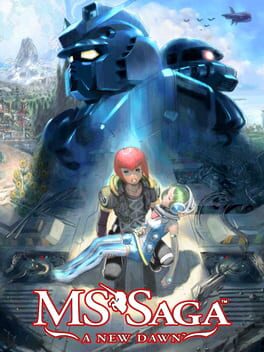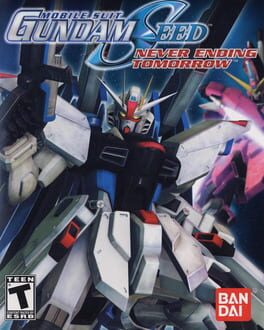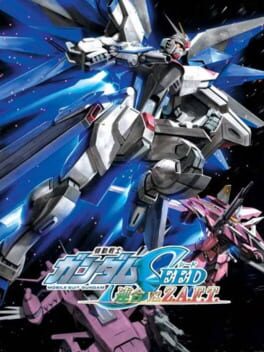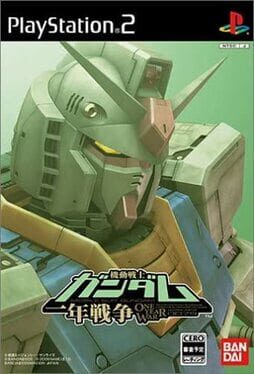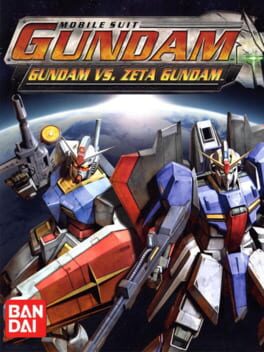

MS Saga is a console-style role-playing adventure, featuring an original storyline, setting, and characters, along with fan-familiar "mobile suit" 'mechs from the G Gundam, Gundam Wing, and Mobile Suit Gundam series. Most battles are fought using mobile suits, and the game allows extensive customization of them, encouraging players to collect and use more powerful parts. The story takes place on a world emerging in the aftermath of a great war. Inhabitants must harness the power of their former enemies, but danger comes as this power begins to slip into the wrong hands.
Also in series
Reviews View More
A very interesting experiment in blending the Gundam franchise with traditional JRPG mechanics.
The game feels low-budget (no voice acting, egregious asset reuse), the plot is very little to write home about and the combat system is kind of shallow and repetitive, but the robot customization and weapon loadout system are genuinely cool.
I really REALLY wish they had made more of those. It feels like they were on to something there, and if they'd been allowed to chase it further, us Gundam sickos could have had something really cool on our hands!
The game feels low-budget (no voice acting, egregious asset reuse), the plot is very little to write home about and the combat system is kind of shallow and repetitive, but the robot customization and weapon loadout system are genuinely cool.
I really REALLY wish they had made more of those. It feels like they were on to something there, and if they'd been allowed to chase it further, us Gundam sickos could have had something really cool on our hands!
Another attempt to broaden Gundam's audience overseas, Bandai's MS Saga: A New Dawn shows a remarkable range of mecha-building options (running the gamut from suit crafting and cosmetics to interchangeable pilots, armors and passives), but is ultimately a competent, if totally generic turn-based JRPG, both narratively (the same war topics and story beats told a million times before) and structurally (town-to-trial loop, low-effort dungeons, linear skill systems, etc.). Except for its grid-oriented, space-dependent weapon equips and a prominent SP bar, one struggles to find any other feature worth mentioning.
Quite possibly one of the more obscure games on my Retro Bucket List. I'm not sure how many people are even aware MS Saga exists. A Gundam JRPG done in a pseudo-SD style and with a plot that is completely untethered from any established Gundam canon is intriguing on paper, but also extremely niche. Even among Gundam enthusiasts, it's gotta be a very thin slice that would find something like this appealing enough to dedicate themselves to a whole playthrough. I am the kind of fanatic, however, who risks serious injury every time they open their closet full of unbuilt Gundam model kits, so maybe I am more hardwired than most for this sort of thing. Trapped under Gunpla boxes screaming for help... they'll find me mummified.
MS Saga's primary gameplay hook is centered around customizing your mobile suits, which can be modified using scrapped parts of enemy mechs. Customizing your party's mobile suits is a process that can get pretty granular at times, and as you get a feel for this system you'll find that you can make some pretty game breaking builds. The option to focus on one or two weapons and a core gimmick is just as available to you as overloading a suit with a variety of weapon types, allowing you to skirt around enemy defenses and exploit weaknesses, something that becomes remarkably important the further you progress. There is of course an aesthetic component of this, though if you focus simply on playing Gundam dress up you probably won't get very far. You can stick to straight builds of suits from various anime series (ranging from standard Universal Century suits to G Gundam and even Gundam Wing), but they often pale in comparison to suits using curated parts from multiple sources. Gouf-Deathscythe-GM hybrids end up becoming murder machines, though you can at least alter their color pallets to make them look more visually pleasing.
This level of customization would be wasted, however, if combat wasn't suitably engaging. Thankfully it is, and while there are a few unnecessary difficulty spikes, MS Saga maintains a fairly good pace throughout, providing you time to get an appreciation for combat and testing your skill appropriately. Weapon types essentially take the place of elemental weaknesses and resistances, and there's a number of status ailments that are just as devastating to get hit with as they are to dish out. Sure, there's nothing so involved as the press-turn system, but MS Saga is far from a brainless affair. It also includes one of my favorite yet sorely underused JRPG features: hot-swapping characters in battle. It actually becomes pretty important here, especially later in the game when certain enemy setups may require a specific counter that's currently in standby. You're also able to build meter for more powerful attacks, which can be done by moving characters to standby, keeping them out of harms way and allowing you to deploy them when it's most advantageous. You have to lean on this system a lot and given how much I love this sort of thing, I really ate it up.
The rest of the game? Well, it's a pretty standard JRPG. The story isn't anything special, and the main cast of characters are pretty bland. Most fit into very typical JRPG archetypes, like the childhood friend who lives in your shadow, or the mysterious young girl who's inextricably linked to some impending apocalypse. Unfortunately, nobody really grows out of these roles, and it becomes very difficult to get invested in anything that's not mechanical. It's unfortunate that a lot of MS Saga's uniqueness is otherwise wasted on something so bland. It's like a rich, hearty soup made with so many different ingredients that is also overloaded with a bunch of saltines.
Deploying food metaphors is a good sign of having run out of anything meaningful to say, so I guess that's the review. See you all next year byeeeee
MS Saga's primary gameplay hook is centered around customizing your mobile suits, which can be modified using scrapped parts of enemy mechs. Customizing your party's mobile suits is a process that can get pretty granular at times, and as you get a feel for this system you'll find that you can make some pretty game breaking builds. The option to focus on one or two weapons and a core gimmick is just as available to you as overloading a suit with a variety of weapon types, allowing you to skirt around enemy defenses and exploit weaknesses, something that becomes remarkably important the further you progress. There is of course an aesthetic component of this, though if you focus simply on playing Gundam dress up you probably won't get very far. You can stick to straight builds of suits from various anime series (ranging from standard Universal Century suits to G Gundam and even Gundam Wing), but they often pale in comparison to suits using curated parts from multiple sources. Gouf-Deathscythe-GM hybrids end up becoming murder machines, though you can at least alter their color pallets to make them look more visually pleasing.
This level of customization would be wasted, however, if combat wasn't suitably engaging. Thankfully it is, and while there are a few unnecessary difficulty spikes, MS Saga maintains a fairly good pace throughout, providing you time to get an appreciation for combat and testing your skill appropriately. Weapon types essentially take the place of elemental weaknesses and resistances, and there's a number of status ailments that are just as devastating to get hit with as they are to dish out. Sure, there's nothing so involved as the press-turn system, but MS Saga is far from a brainless affair. It also includes one of my favorite yet sorely underused JRPG features: hot-swapping characters in battle. It actually becomes pretty important here, especially later in the game when certain enemy setups may require a specific counter that's currently in standby. You're also able to build meter for more powerful attacks, which can be done by moving characters to standby, keeping them out of harms way and allowing you to deploy them when it's most advantageous. You have to lean on this system a lot and given how much I love this sort of thing, I really ate it up.
The rest of the game? Well, it's a pretty standard JRPG. The story isn't anything special, and the main cast of characters are pretty bland. Most fit into very typical JRPG archetypes, like the childhood friend who lives in your shadow, or the mysterious young girl who's inextricably linked to some impending apocalypse. Unfortunately, nobody really grows out of these roles, and it becomes very difficult to get invested in anything that's not mechanical. It's unfortunate that a lot of MS Saga's uniqueness is otherwise wasted on something so bland. It's like a rich, hearty soup made with so many different ingredients that is also overloaded with a bunch of saltines.
Deploying food metaphors is a good sign of having run out of anything meaningful to say, so I guess that's the review. See you all next year byeeeee
